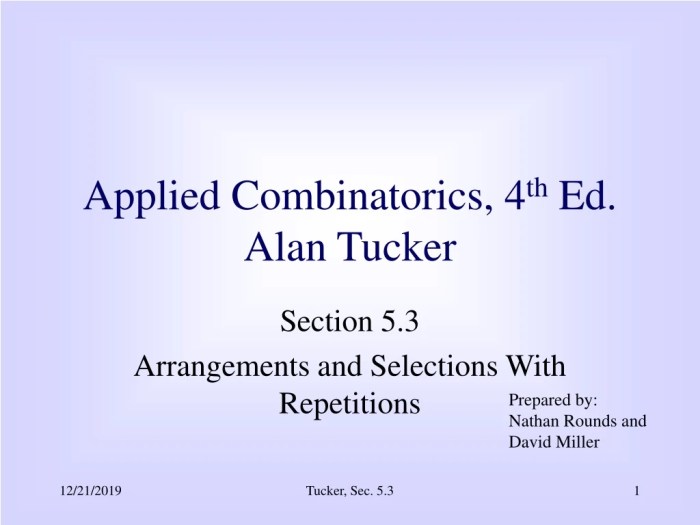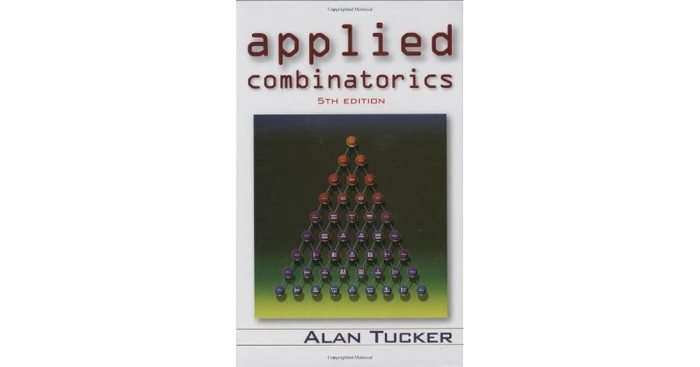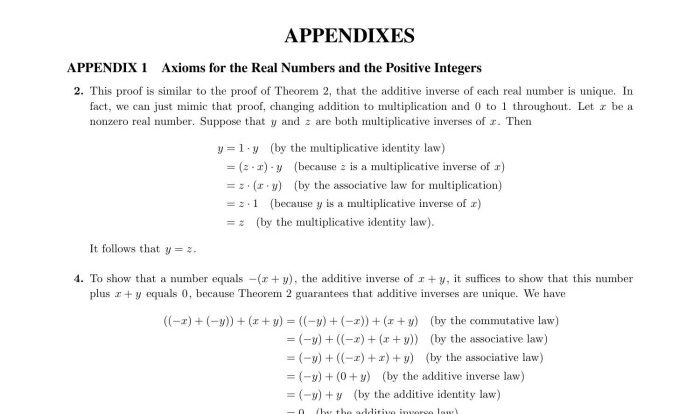Alan tucker applied combinatorics pdf – Alan Tucker’s Applied Combinatorics is an indispensable resource for anyone seeking to delve into the fascinating world of combinatorics. This authoritative text provides a comprehensive exploration of fundamental concepts, methods, and applications, making it an essential guide for students, researchers, and practitioners alike.
Tucker’s clear and engaging writing style makes complex combinatorial concepts accessible, while his thorough coverage ensures a deep understanding of the subject matter. The book’s emphasis on applications in diverse fields, such as computer science, statistics, and engineering, highlights the practical significance of combinatorics in solving real-world problems.
Introduction to Alan Tucker’s Applied Combinatorics
Alan Tucker’s Applied Combinatoricsis a comprehensive and accessible introduction to combinatorics, the study of counting and arranging objects. The book is widely used as a textbook for undergraduate courses in combinatorics and discrete mathematics.
Tucker’s book is notable for its clear and concise writing style, as well as its extensive use of examples and exercises. The book covers a wide range of topics in combinatorics, including permutations, combinations, generating functions, and graph theory.
Target Audience and Purpose
Tucker’s Applied Combinatoricsis written for students with a background in basic mathematics. The book is intended to be used as a textbook for undergraduate courses in combinatorics and discrete mathematics.
The book can also be used as a reference for professionals who need to use combinatorics in their work. The book’s clear and concise writing style makes it a valuable resource for anyone who needs to learn about combinatorics.
Core Concepts and Methods
Combinatorics, a branch of mathematics, explores the study of arrangements, selections, and configurations of objects. Its core concepts include permutations, combinations, and partitions.
Permutations deal with the arrangement of objects in a specific order, while combinations focus on the selection of objects without regard to order. Partitions involve the division of a set of objects into subsets that are mutually exclusive and collectively exhaustive.
Fundamental Principles
- The Fundamental Principle of Counting states that if an event can occur in mways, followed by another event that can occur in nways, then the total number of ways the two events can occur is mx n.
- The Multiplication Principle extends this concept to multiple events, allowing for the calculation of the total number of outcomes by multiplying the number of outcomes for each event.
- The Addition Principle states that if an event can occur in mways or nways (mutually exclusive events), then the total number of ways the event can occur is m+ n.
Applications
Combinatorics finds applications in various fields, including probability, statistics, computer science, and operations research. It helps solve problems related to:
- Counting the number of possible outcomes in a given scenario
- Determining the probability of a specific outcome
- Optimizing the allocation of resources
- Designing efficient algorithms
Applications in Various Fields

Combinatorics, with its powerful techniques, finds widespread applications in various fields, significantly contributing to technological advancements and solving real-world problems.
In computer science, combinatorial techniques are employed in algorithm design, optimization problems, and data structures. For instance, combinatorial algorithms are used to determine the shortest path in a network or find the optimal solution to a complex optimization problem.
Statistics
Combinatorics plays a crucial role in statistics, particularly in probability theory and data analysis. Combinatorial techniques are used to calculate probabilities, design sampling methods, and analyze statistical data. For example, combinatorial principles are applied in determining the probability of drawing a specific hand in a card game or estimating the population size based on a sample.
Engineering
In engineering, combinatorics is used to design efficient systems and optimize resource allocation. Combinatorial techniques are applied in network design, scheduling problems, and resource allocation. For instance, combinatorial algorithms are used to design optimal communication networks or optimize production schedules in manufacturing systems.
Advanced Topics and Extensions: Alan Tucker Applied Combinatorics Pdf

Combinatorics has vast applications in various fields, including computer science, statistics, and engineering. Advanced topics in combinatorics delve into specialized areas, extending the core concepts and methods to address complex problems.
This section explores advanced topics in combinatorics, examining their connections to other mathematical disciplines and highlighting the latest research and developments in the field.
Graph Theory
- Graph theory studies the properties and applications of graphs, which are mathematical structures consisting of vertices (nodes) and edges (connections).
- It has applications in network analysis, optimization, and data science.
Matroids, Alan tucker applied combinatorics pdf
- Matroids are combinatorial structures that generalize the concept of linear independence in vector spaces.
- They find applications in coding theory, optimization, and network design.
Coding Theory
- Coding theory deals with the design and analysis of codes, which are used to transmit information efficiently and reliably in the presence of noise.
- It has applications in communication systems, data storage, and cryptography.
Connections to Other Areas of Mathematics
- Combinatorics has strong connections to algebra, geometry, and number theory.
- These connections enable the application of combinatorial techniques to solve problems in other mathematical disciplines.
Latest Research and Developments
- Current research in combinatorics focuses on topics such as extremal combinatorics, probabilistic combinatorics, and algebraic combinatorics.
- These advancements contribute to the development of new algorithms, techniques, and theoretical frameworks.
Exercises and Solutions

Exercises and solutions play a pivotal role in the learning process of applied combinatorics. By engaging with a comprehensive set of exercises and practice problems, students can reinforce their understanding of the concepts covered in the book.
Importance of Solving Exercises
Solving exercises is crucial for developing problem-solving skills, a key aspect of applied combinatorics. It allows students to:
- Test their comprehension of the concepts.
- Identify areas where they need further clarification.
- Develop critical thinking and analytical abilities.
- Build confidence in their problem-solving abilities.
Detailed Solutions
To facilitate effective learning, the book offers detailed solutions and explanations for selected problems. These solutions provide step-by-step guidance, helping students to understand the reasoning behind the solution and to identify common pitfalls.
Practice Problems
The book includes a wide range of practice problems covering various difficulty levels. These problems are designed to challenge students and to help them develop a deep understanding of the subject matter.
Helpful Answers
What is the target audience for Alan Tucker’s Applied Combinatorics?
Alan Tucker’s Applied Combinatorics is intended for students, researchers, and practitioners in mathematics, computer science, statistics, and engineering who seek a comprehensive understanding of combinatorics and its applications.
What are the key features of Alan Tucker’s Applied Combinatorics?
Alan Tucker’s Applied Combinatorics is known for its clear and engaging writing style, thorough coverage of fundamental concepts and methods, and emphasis on applications in diverse fields. It also includes a comprehensive set of exercises and practice problems to reinforce understanding.
How can I access Alan Tucker’s Applied Combinatorics?
Alan Tucker’s Applied Combinatorics is available in print and electronic formats. It can be purchased from various online retailers and academic publishers.
